Peter MALONE
Saturday, 18 September 2021 19:44
Thirty Seconds Over Tokyo
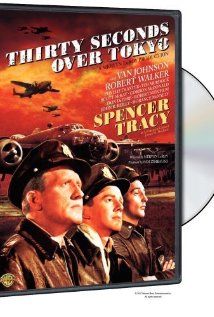
THIRTY SECONDS OVER TOKYO
US, 1944, 138 minutes, Black and white.
Spencer Tracy, Van Johnson, Robert Walker, Phyllis Thaxter, Tim Murdock, Don Defore, Robert Mitchum.
Directed by Mervyn Le Roy.
Thirty Seconds Over Tokyo was a big-budget M.G.M. production of 1944, highlighting the planning of the first bombing raids on Japan in World War Two. It was a piece of propaganda material, effective as such. It was also a semi-documentary with the presentation of the military, the Air Force, the Navy, training, the bombing raids.
The black and white photography received an Oscar nomination. The film has a sense of realism - though the human element is treated with Hollywood feeling and sentiment. Spencer Tracy makes a guest appearance as Lieutenant Colonel Doolittle. The star of the film is Van Johnson - and he emerged as a popular star at this time. He received support, somewhat anonymously, from Robert Walker, Don Defore, Stephen McNally? and a young Robert Mitchum. Phyllis Thaxter is the wife back home.
The film is conventional in its framework but still has the courage of its '40s convictions. It was directed by Mervyn Le Roy who had started with small-budget crisp films at Warner Bros. and moved to lavish productions at M.G.M. (Blossoms in the Dust, Random Harvest).
1. A satisfying war propaganda film? Impact in its time? Later decades?
2. M.G.M. production values: black and white photography, the documentary style of the flight sequences, the bombing sequences in Tokyo? The studio sets for China? The star cast? The rousing and atmospheric score?
3. The title and its focus on the war on Japan, the bombing raids, the bombing of Tokyo -,and, in hindsight, the anticipation of Hiroshima and Nagasaki?
4. The impact of this kind of propaganda material in the 1940s? American morale-boosting, self-confidence, the justness of the cause? The American training? -The backing of American way of life and values? Biddies and going on missions? Suffering, mutual support? The heroism and the honour given to the heroes? The attitudes towards Japan - hostility, but in the later part of the film, a focus on common humanity?
5. Spencer Tracy's guest spot as Lieutenant Colonel Doolittle - authenticity and authority for the war, not mincing matters, his information, training sessions, relationship with the men? Leading them? His contact with Ellen, the visit to Ted? The backing of the American-military?
6. The focus on Ted Lawson as the central character? His work with the group, his knowledge and skills, skills as a pilot? Friendship with Bob Gray, shared memories? With the group? Ellen's arrival, the discovery of her pregnancy, his exuberance, going on, relationship with his men? His skill in the flight over Tokyo? The decision about crash landing, in the sea, injuries, the Chinese, his suffering, the vivid amputation of his leg (and his memories of Ellen, the crash and the felling of the tree,symbolising his leg)? The honour from the Chinese? The return home, not wanting to see Ellen, Doolittle's visit, Ellen's arrival and the reconciliation? A satisfying portrait of the typical World War Two American hero?
7. The presentation of the men - as individuals, their commitment, their skills, friendship, mutual support, training? The tight security? The details of the training, going onto the ships, to Japan? The mission, each doing his own job, the skill of the navigator, the bombardier, the gunner? Mutual support in trouble, injuries? The presentation of the American forces during World War Two?
8. Ellen as symbolising the women of America, the devotion to her husband, pregnant, in love, support? Not knowing where her husband was? The joy of his homecoming? The suffering? Morale-boosting?
9. The details of training, the fitness of the men, their skills and accuracy? The mission itself, the creative use of rear projection photography for the flight over Tokyo, the accuracy of the bombings, the crash into the sea?
10. The Chinese and their support, the missionaries, the help with surgery and medication? The role of allies in World War Two?
11. The film in hindsight - as story, propaganda, morale-booster, entertainment?
Published in Movie Reviews
Published in
Movie Reviews
Tagged under
Saturday, 18 September 2021 19:44
This Thing Called Love
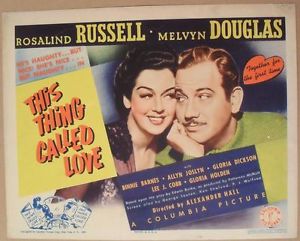
THIS THING CALLED LOVE
US, 1941, 98 minutes, Black and white.
Rosalind Russell, Melvyn Douglas, Binnie Barnes, Allyn Joslyn, Lee J. Cobb, Gloria Holden.
Directed by Alexander Hall.
This Thing Called Love (from a Cole Porter song) is a typical screwball comedy of the '30s and '40s - one of the several teamings of Rosalind Russell and Melvyn Douglas. Director is Alexander Hall - who had worked with the stars quite often (My Sister Eileen).
'The film is an amusing version of the battle of the sexes - with some comment about marriage and relationships and the emerging woman of the '40s. In fact, the film seemed somewhat risque and ran into trouble with the American Legion of Decency.
Today it seems quite tame, even dated - but is engagingly played by its stars.
1. An entertaining comedy of the '40s? Impact in its time? Daring? Later? An example of the Hollywood screwball comedy?
2. Production values: the stars, black and white photography, the affluent and professional world of America?
3. The title and its focus? Ann and her theories about marriage, relationships, commitment? Tyce and his expectations of marriage? Romance clashes, betrayal? The humorous parallels with the other characters and their marriages?
4. The focus on Ann - her role at the board meeting, her theories about marriage and friendship? Her love for Tyce - melting at his phone call? Proposing her theories? The marriage, the home, her furthering her professional career, leaving him to his work? Living together - but preparing for the relationship and the romance? Ann and her business career? Tyce and his behaviour, seeming betrayal? The farcical comedy with Harry and his wife - and their being in and out of love? Trying to get then. to stay in the house, to leave? Her eventual return - and changing her theories? An amusing portrait of the 40s businesswoman? Rosalind Russell's comic style and timing?
5. Tyce and his return from South America, eagerness for the marriage, discussions with Ann, the marriage ceremony, the celebrations, the home? His being put at arm's length? His devices to entice Ann to the marriage? The irony of the misunderstandings? Charlotte Campbell and the poison ivy? his deception about his sick friend? The ups and downs of marital comedy? The happy ending?
6. Harry and his friendship, his own marriage, the clashes with Florence, the visit to Ann and Tyce, the mix-ups of their relationship? The humorous comment on marriage?
7. Charlotte Campbell and her devotion to Tyce, relationship, meals, being caught in compromising situations - with her dress, the swimming? The poison ivy and the revelation of the truth?
8. Ann's sister and-their discussions, marriage, divorce?
9. The de Estros and Latin America, the visit, the customs, the misunderstandings, staying the weekend?
10. Hollywood light treatment of the battle of the sexes, romance and marriage, commitment, betrayal and suspicion? The happy resolution and the.traditions of the happy marriage?
Published in Movie Reviews
Published in
Movie Reviews
Tagged under
Saturday, 18 September 2021 19:44
Thief of Hearts

THIEF OF HEARTS
US, 1984, 100 minutes, Colour.
Steven Bauer, Barbara Williams, John Getz, David Caruso, Christine Ebersole, George Wendt.
Directed by Douglas Day Stewart.
Thief of Hearts was written and directed by Douglas Day Stewart (author of The Blue Lagoon, An Officer and a Gentleman). Stewart has an eye for the lush contemporary American melodrama. This is a romantic oddball story - a portrait of a thief, his relationship with a married woman whose diary he steals and to whom he relates as the fantasy figure of her diary. The world is the world of soap opera - but with the lush style, the sexual frankness of the '80s and a seemingly amoral/moral point of view.
1. Adult entertainment? The blend of caper/sexcomedy romance - with serious undertones?
2. The affluent world of San Francisco? Restaurants, homes, the world of the designer? Affluence and glamour? The use of San Francisco locations? The soft and lush atmosphere, colour photography? The creation of an atmosphere of intimacy, sexuality?
3. The contemporary themes of relationships, roles of men and women, sexuality, fantasy/reality? Sex and violence? Betrayal?
4. The credibility of the plot - or something of a diary fantasy, dream? The demon diary lover genre?
5. Ray and Mickey, the anniversary outing, the robbery and their reaction? The quality of their marriage, strengths and weaknesses of their relationship? Ray and his work, writing children's books, not appreciating Mickey? Marty as a friend? Helping in the detection? The visit to the warehouse and the potential violence? Mickey as a talented woman, confiding her fantasies to her diaries, Michelle in her diaries? The effect of the diaries being stolen? The chance encounter with Scott? Fascination, undertaking his commission? The seduction? The use of the gun symbol for the relationship, sexuality, violence, fantasy? Scott fulfilling the details of her diary? Her tastes, the boat, the details of the affair? Mickey and the discovery of the truth - and her attitude towards reality compared with that of her diary? The robbery and Mickey shooting, the audience thinking that Scott was dead, her letting Scott go? The plausibility of the characters and their relationship on the level of reality, on the level of fantasy?
6. Scott and his background, robbery, his skill in burglary, his friendship with Buddy? His taste, taking the diaries, reading them and the effect, spying on Mickey, arranging to meet her, the commission, the meals, the sharing, the seduction, the guns, the nature of the affair, discovery of the truth, fighting Buddy, his final escape? The title of the film referring to him?
7. The contrast with Buddy as tough, working as a waiter, fawning on the rich, the plan, communications, success? His violent outbursts? Greed, drugs, the warehouse, the fight, his death?
8. The character sketch of Marty, his relationship with Ray, helping him in the detection?
9. Reality and fantasy, dreaming and waking fantasies? Soap opera themes stylishly done?
Published in Movie Reviews
Published in
Movie Reviews
Tagged under
Saturday, 18 September 2021 19:44
Throw Momma From the Train
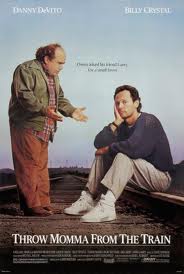
THROW MOMMA FROM THE TRAIN
US, 1987, 88 minutes, Colour.
Danny de Vito, Billy Crystal, Anne Ramsey, Kim Greist, Kate Mulgrew, Branford Marsalis, Rob Reiner.
Directed by Danny de Vito.
Throw Momma From the Train certainly has an arresting title. It stars and was directed by Danny de Vito (Ruthless People, Romancing the Stone, The Tin Men). It co-stars popular comedian Billy Cristal as well as Ann Ramsay as a terrible mother. There is a guest spot by Oprah Winfrey and Rob Reiner as an agent.
The film acknowledged its borrowing from Hitchcock's Strangers on a Train. It is the situation where murders must be done - and it is proposed that two men do each other's murders. Danny de Vito, a would-be writer with a harridan mother, takes his part seriously. Billy Cristal as a divorced and harassed would-be
writer finds himself mixed up in something that is beyond him.
The fi1m, however, is pleasant and has a happy ever after ending,which means that, in some ways, it has its cake and eats it: thriller tactics, murder, comedy and sentiment. There is a Hitchcock-style score (like those of Bernard Herrmann) by David Newman.
1. A pleasing comedy, thriller?
2. The background of Strangers on a Train, Larry's explanation of the theory: eliminate the motive, the criss-crossing of responsibilities for killing? Owen watching Strangers on a Train in the cinema? The blend of the light and the serious?
3. Larry's world, novelist, divorce, rich wife, Hawaii, writing? The contrast with Owen's world, home, writing? The Hawaiian sequences? The musical score - as from a Hitchcock film?
4. The ideas about murder, mysteries, motives, alibis, writing, fantasy, reality?
5. Larry and writer's block, the amusing collage during the credits? Seeing Margaret on television? Upset, his behaviour with the class, listening to their stories, despising them? The mix-ups with Beth? His not doing things? Teaching, listening to the woman writer and her story about submarines? Not reading Owen's story? Bewildered at home, the opening, 'The night was ...'? The meeting with Beth, the abuse of Margaret, his class hearing this (and later using it for the police)? Owen following him, with Beth in the train? His talk with Owen and their discussion about Hitchcock?
6. The contrast with Owen: typing, at home, his mother's demands, imagining poisoning her, the scissors through her ears? Class, wanting his story to be read? Larry saying it was terrible (having only two characters, one of whom was killed)? Following Owen, at the train with Beth? The motives?
7. Owen going to Hawaii, entering Margaret's house, the gardener and the sex, the telephone call, onto the boat, pushing her overboard, the humorous collage of phone calls, meeting Larry, driving the car and crashing through the trees?
8. Larry and his exasperation with Margaret, her wealth, going to his agent and being let loose, drinking on the beach, the flat battery, the phone calls from Owen, borrowing his friend's car, driving recklessly, the frantic visit to Beth, the crash?
9. At Owen's home, the discussion about the murder, meeting Momma and being hit on the head with the frying pan, the ice, looking at Owen's coin collection - and the memories of his father, the possible ways of killing Momma: as a burglar, the doorway to the stairs (and his falling down)?
10. The police, the interview with Larry's friend, with Beth, her giving away the information? The arrival at the house, interrogating owen, Momma's arrival? Larry hiding in the pantry and Owen enticing the policeman to go there for tea and sugar?
11. Momma and:her attacking Larry, hearing the news on the television, trying to phone? Their being on the train, chasing Momma through the train, the Bingo carriage, saving her from falling?
12. Margaret, the divorce, taking her husband's novel, talk show, the wealth, the earrings, sex with the gardener on the boat? The irony of her being saved and doing a film deal? Larry in hospital and his exasperation watching Margaret? The complaints of his fellow patient?
13. The characters in the class, his sex coffee table book, his eye on Beth? The woman with her submarine novel?
14. Larry finally getting his novel started, Owen arriving and his being throttled, the irony of Owen's picture book? The happy ending -between hate and love?
15. The film and its references to other films, amusing for film buffs? Fantasy/reality?
Published in Movie Reviews
Published in
Movie Reviews
Tagged under
Saturday, 18 September 2021 19:44
Thunder Road
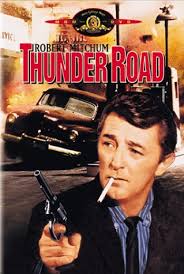
THUNDER ROAD
US, 1958, 92 minutes, Black andwhite.
Robert Mitchum, Gene Barry, Jacques Aubuchon.
Directed by Arthur Ripley.
Thunder Road.is a road film which has achieved something of cult status in succeeding decades. It is based on an original story by Robert Mitchum, who also sings the theme song in the film. To continue the family association, his son Jim Mitchum portrays one of his brothers. (The film anticipates another film about bootlegging with Mitchum in the '70s, Moonrunners.)
The film is familiar material, the bootlegging families of the mountains and their clashes with gangsters as well as the police. However, the film is efficiently written and made - and is interesting and entertaining of its kind.
1. The road film? The film about bootlegging? Action features? Part of the American heritage? The reputation of this film and its cult status?
2. Black and white photography, the atmosphere of Harlen County, the mountains, the stills, the road and action sequences, the cities?
3. The title and the theme for a road film? The song and the iyrics?
4. The focus on the families and the illicit stills? The generations working the stills? The range of customers? The various families in the hills and their collaboration? The city gangsters trying to intimidate and take over the stills and the trucking? The clashes? The Federal agents and their involvement? The film combining these strands for an effective thriller?
5. The Doolan family and their operation? Vernon and his working the still, his influence on his sons? Lucas and his deliveries? his skill as a driver? Robin and his admiration for his brother? The details of their life, home, friends?
6. Kogan and his-coming from Detroit, the pressure on the family, the attempt to take over the still? The ambushing of the truck? The killing of the driver? The decision to take Lucas? As a hostage? Lucas's escape, his defying of Kogan? Lucas in the city, at the nightclub, with Frances? Kogan and his attempts to retaliate? The arrest?
7. Troy Barrett and the Federal agents, their knowledge of the bootlegging, the following of the gangsters? Trying to do deals? Trying to influence Lucas?
8. The final confrontation, the chase, Kogan and his violence, the crash ,into the pylon?
9. The pessimism of the screenplay? The passing of the old families? The gangsters and their violence? The enforcement of the law by Federal agents? An atmosphere of death?
10. The reputation of the film? The archetypal bootlegging film? The contribution of Robert Mitchum, his manner and style? The song?
Published in Movie Reviews
Published in
Movie Reviews
Tagged under
Saturday, 18 September 2021 19:44
'Til We Meet Again
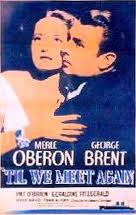
'TIL WE MEET AGAIN
US, 1939, 99 minutes, Black and white.
Merle Oberon, George Brent, Frank Mc Hugh, Pat O'Brien, Geraldine Fitzgerald, Eric Blore, Binnie Barnes, Henry O'Neill, George Reeves.
Directed by Edmund Goulding.
'Til We Meet Again is a soft romantic soap opera of 1940. It is a remake of Tay Garnett's One Way Passage (1932).
It is a variation on the shipboard romance: she is terminally ill, he has just been arrested for murder and is being accompanied by the police back to San Francisco. Neither tells the other the truth. However, they both find out just before the voyage ends but do not reveal the truth to each other.
Merle Oberon is suitably romantic as the heroine, supported by Geraldine Fitzgerald as a concerned friend and Binnie Barnes, very good as a con-woman. George Brent is the romantic hero - very popular in films
at this time including director.Edinund Goulding's Dark Victory, The Great Lie. Pat O'Brien is good as the policeman. Frank McHugh?, who appeared in the early film, repeats his role as a con-man in this one.
The film is hazily romantic - and has not weathered the years as well as many other Warner Bros. romantic melodramas.
1. Popular romantic soap opera of the '30s-,'40s? Popular themes? Contempordry treatment? In later decades?
2. Warner Bros. production values: the strong cast and director? The atmosphere of the Far East? Shipboard life and romance? Some action sequences? Romantic sequences? The romantic score?
3. The title and its romantic evocations? The original title: One Way Passage? Indication of treatment, style and themes?
4. The popularity of the shipboard romance? The exotic atmosphere of the Far East and Hong Kong? International travellers? The romantic heroine? The suave hero? The supporting cast assembling for the voyage? The ambiguities? The couple falling in love? Audiences wondering how the romance will be resolved?
5. Merle Oberon as Joan: on her travels, her condition, her maid, the doctor's visits and reports, her turns?The friendship with Bonnie? Bonnie helping her, the truth, her criticism of her about the truth of Dan? Reconciliation? The encounter with Dan at the bar, the attraction, the toast and the smashing of glasses - repeated throughout (and by Bonnie at the end)? Falling in love with Dan, life on the ship, romantic sequences and interludes, her illness? Her courage, wanting to enjoy the voyage? Her concealing the truth from Dan? The reporter at San Francisco and the blunt telling of the truth? Her heroism in the finale with him? Letting him go?
6. Dan in Hong Kong, Steve arresting him, the ruse of going overboard, his rescuing Steve? The background of his criminal record? Steve's pursuit of him? The encounter with Joan, not telling her the truth? The shipboard romance? His past friendship with the Countess, with his con-man friend? Escaping Steve to have conference with them? The build-up to the escape plan? Joan's turn and his bringing her back to the ship? His trying to elude Steve? His finally going to prison?
7. Steve as the solid policeman, a man of compassion, his pursuing Dan, being rescued in the harbour, allowing Dan freedom on the ship, the infatuation with the Countess - and then finding out the truth? The struggles, his hold over Steve?
8. The sketch of the Countess - and her background, changing accents, con-tricks, love for Dan, willingness to help him? His friend and the suspicion of the police, the ship's officers? His helping in the plan? Comic touches?
9. The skit on the pompous Englishman - card-playing, victim of tricksters, the Countess and her friend, card games?
10. The background of life on the ship, officials, social functions? Popular material for audiences - the situation, the romance, the realism and the fantasy?
Published in Movie Reviews
Published in
Movie Reviews
Tagged under
Saturday, 18 September 2021 19:44
Tin Men
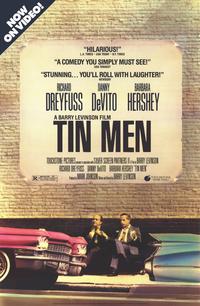
TIN MEN
US, 1987, 110 minutes, Colour.
Richard Dreyfuss, Barbara Hershey, Danny de Vito, John Mahoney, Bruno Kirby, Seymour Cassell.
Directed by Barry Levinson.
Tin Men was written and directed by Barry Levinson. Levinson grew up in Baltimore and made a film about his teenage and early adult years in that city, Diner. It was a critical success. Here he is again in Baltimore a few years later, 1963. It is a city he knows well and he is able to draw his characters expertly in their Baltimore context.
The tin men of the title are salesmen who have scams to persuade customers to have aluminium sidings added to their houses. The film shows salesmen at work, their cons, their collaboration together and their mateship in telling stories about their successes. The film focuses on two tin men who have a car crash and then fight with onother, destroying each other's cars, and one seducing the other's wife. Meanwhile there is a government investigation into the industry.
Richard Dreyfus and Danny de Vito work well together as the clashing tin men. De Vito has an abrasively energentic style (Ruthless People, Romancing the Stone, Jewel of the Nile, Wise Guys). Richard Dreyfus shows what a screen presence he has. Barbara Hershey is excellent as the wife, used by both men.. There is also an excellent gallery of character actors who bring the tin men vividly to life.
The Tin Man of the Wizard of Oz had no heart - and neither do these tin men. However,.with the shrewdnees and perceptiveness of the writing and its sense of authenticity, The Tin Men is an arresting and sometimes funny comic portrait of America---in the '60s and the signs of change.
1. A piece of Americana? America in the'60s? The end of the Kennedy era? Barry Levinson and his writing, directing - and his experience of Baltimore?
2. The re-creation of the period: Baltimore 1963, homes, cars, lifestyles, manner and vocabulary, the wide range of contemporary songs?
3. The significance of the period: the '60s, changes, John F. Kennedy about to die? The shattering of the American Dream? Success, money, jobs? The acceptability of hustling - on the level of nickels and dimes, on a wide scale? The advertisements, justice? The increase of corporate salesmanship and cons as the '60s and '70s went on?
4. The title, the reference to the aluminium siding salesmen, the reference to the Wizard of Oz?
5. Levinson's skill with portraying people, observing people, behaviour, manners, talking, male bonds?
6. The initial clash: B.B. and his buying his car, demands, not wanting to be tricked? The importance of the Cadillac image? The contrast with Tilley at home, the clash with his wife? The build-up to the crash? The comic melodrama of their fighting, bickering? The repercussions - fighting? Discovering that each was a tin man? The mutua1 smashing and bashing of cars? Abuse, fight set-ups? The backing of each's group of friends? B.B. and his plan with Nora - and the irony of its backfiring and his falling in love?
7. Richard-Dreyfus? as B.B.: selfish, self-opinionated, not wanting to be tricked while being the master of the con, the car, his work? Seeing his operating with the 'Life Magazine' scam with the unsuspecting housewife? The many sequences of the buddies and their talking, telling stories? At home, his selfishness? The crash, the clash with Tilley, fighting him, smashing the car? His motives? The discovery of Nora, the meeting In the supermarket, his ingratiating himself into her favour, taking her out, the seduction? Ringing Tilley vindictively? Tilley's reaction? Nora moving in, the change in his lifestyle? The truth and hurting Nora? The effect on him? The background of the government investigation? The changing style of salesmanship, the effect on the buddies? His discovering that he had fallen in love? His decision about the testimony for the hearing? His encounter with the Commission to spy? Losing his card? His future - and Volkswagens? The resolution of his clash with Tilley? Their talking together after the investigation? Portrait of an American male and his ethos?
8. The contrast with Tilley and Danny de Vito’s style? Small, mean? Love for his wife, clashing with her? His scams, losing his ability, his clashes, his friendships and the buddies talking with him? His becoming morose? The crash, his disbelief in B.B's reaction, his smashing his car? The boss and lending him money? The relationship with Nora. his reaction to B.B's phone call, throwing Nora's clothes out and getting rid of her? Going downhill? The fights, the friends, talking, becoming the fall guy for the boss at the inquiry, his trying to put it over the Commission, meeting B.B.? His future?
9. The gallery of buddies, their memories, manner, insights, scams, talk, types? Their support and reaction to the clash? A study in idiosyncrasies?
10. The boss, the company, lending the money, making Tilley the fall guy?
11. The inquiry, the interrogations, the information supplied, the espionage within the firm?
12. The clients, their motives, their falling for the confidence tricks, the amount of money required of them? Giving information to the inquiry?
13. The portrait of Nora, her marriage to Tilley, his making her laugh, the unromantic life, the mundane nature of the similarity of the houses in the street, at the supermarket, her life? The attraction to B.B., falling in love, the seduction, Tilley throwing all her clothes out, the effect on her, going back.to B.B..; hurt about the truth, her friends at work, the importance of her having that refuge, B.B. and his courting her again at work, a new life?
14. The sardonic comedy? The satire? Hard tin men, yet?
Published in Movie Reviews
Published in
Movie Reviews
Tagged under
Saturday, 18 September 2021 19:44
To Live and Die in L.A.
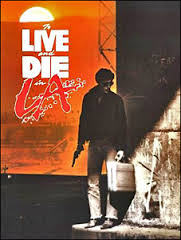
TO LIVE AND DIE IN L.A.
US, 1985, 116 minutes, Colour.
Willem Dafoe, William Peterson, John Pankow, John Turturro, Dean Stockwell, Robert Downey Jr, Darlanne Fluegel, Michael Greene.
Directed by William Friedkin.
To Live and Die in L.A. is a film by William Friedkin (The French Connection, The Exorcist). It is a very tough look at U.S. agents working in Los Angeles for security and uncovering a counterfeit note ring. The film is violent, has unsympathetic characters, presents a squalid picture of Los Angeles. It also presents a grim picture of law enforcers, individualists dedicated to the law -but just as dedicated and relentless as the criminals they pursue. They seem also to be ruthless, exploiters - and can also be corrupted.
The film resembles many of the television series of the '80s, especially Miami Vice, with its emphasis on action and visual style. Friedkin is excellent with his visuals, has a contemporary music score for atmosphere. There is a long and effective carchase which rivals the celebrated car chase in his French Connection.
Interesting, but grim and depressing.
1. Audience enjoyment of police thrillers? Agents and law enforcement? Tough and violent style? Contemporary portrait of Los Angeles?
2. Locations, the city of Los Angeles and its environment, the countryside round about? Atmosphere? The musical score, its beat and mood, the mood and beat of the city?
3. The film's use of violence? Visual impact? Special effects? Stunts? The car chase and its speed, pacing, excitement?
4. The prologue about the President and the terrorists, the role of security guards,,crises, dangers, effective saving of lives? Pace and interest? An indication of themes to come? The individuals, friendships, the letting off steam, retiring, plans and fishing, the older man's investigation, scouting out the counterfeit headquarters, his death?
5. The focus on Eric Masters, his aunt, burning the painting, the long attention to detail for his preparing the notes for printing? His henchmen? Distribution? Wealth? Contacts and covers? His girlfriend and her helping him? The fence and his double-dealing? Contact with paid killers? Influence in prison? Contact with fashionable lawyers? Protection, a man of vengeance?
6. The character of Masters: as brutal, in himself, dedicated to his work, girlfriend and the sleazy show, sleazy surroundings, her investigating,, his doing deals in fashionable athletic clubs, his going to prison to see his courier, threats, hiring the assassin and his pontrol over the assassin, the fight with the negroes and their deaths, doing a deal with the agents without knowing it, yet his suspicions, the build-up,, the confrontation and the shbot-out, his burning his warehouse, his being burnt to death? An ugly portrait of an ugly criminal?
7. Chance and his work as a security guard, friendship, the importance of the sequence of his diving off the bridge and the exhilaration of being caught up? Its symbol of his attitudes towards his work? The relationship with the girl and his hold over her because of parole', using her for sex, information?, His new partner and hit wariness, influencing him, controlling him? His relentlessness against Masters? The investigations, the stake-out in the monastery, the pressures, the airport catching of the courier, his going to jail, interrogations, visiting him, his getting him out and his being tricked in the hospital, the plan about the train and the money, his using it to set up Masters, the interviews with Masters, the car chase and the deaths, his avoiding accountability, build-up to catching Masters, the confrontation, the suddenness and unexpectedness of his death? An unsympathetic law enforcement agent? His mistakes, his attitudes of certainty? His sudden death and the end of everything?
8. The contrast with Johnny, his background, wanting to be a partner, stances and shifting ground, helping in the investigations, the stakeout, the airport, joining in the set-up against Masters, involvement at the railway station, driving the car and the chase, his going to see Masters' lawyer to extricate himself, the possibility of deals, his not giving information against his partner, his being caught, following Masters, the fight? His return to the girl and his taking over Chance's operation? His being corrupted, hardened?
9. The courier, his work at the airport, going to jail, the visit, the murder attempt, his alleged willingness to testify, his shrewd escape from the hospital, being caught by Chance?
10. The lawyer and his money, smooth, the deals with Masters, talking with Johnny, playing each side?
11. The criminals of Los Angeles? masters' henchmen, the double-dealer who was killed? The sleazy nightspots of Los Angeles? The ghettos?
12. Themes of law and order? To what purpose? At what cost?
Published in Movie Reviews
Published in
Movie Reviews
Tagged under
Saturday, 18 September 2021 19:44
Toll of the Sea
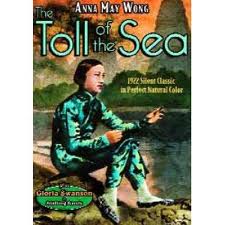
TOLL OF THE SEA
US, 1922, 55 minutes, Colour.
Anna May Wong, Kenneth Harlan.
Directed by Chester M. Franklin.
Toll of the Sea is a 1922 romantic melodrama. It was the first film to be made with two-colour Technicolor. It was restored during the '80s by the Film Archives at the University of Southern California.
The film was written by Frances Marion (from a play by David Belasco). It is a Chinese variation on the Madame Butterfly story. Anna May Wong is Lotus Flower, a young Chinese who falls in love with an American. She has a child by him. He pledges fidelity, but influenced by Americans in China, he returns to the United States and marries his fiancee. The couple return to China, the wife approaches Lotus Flower and offers to adopt the child. Lotus Flower gives the child to the wife - and then drowns herself. The motif of the sea and its cliffs goes right through the film from the opening with Lotus Flower playing on the cliffs and discovering the almost drowned man to her final succumbing to the sea. The background of a fishing village also highlights the theme of the sea. The film is brief, is made with acting restraint (in comparison with some of the histrionics of silent films). It is romantic - with drawings on the dialogue captions. The film is quite emotional.
Anna May Wong the star moved to a successful Hollywood career from this film. Director is Chester M. Franklin who worked with D. W. Griffith on children's films and continued to make feature films in the silent and sound era.
The film is an interesting example-of colour experimentation and creativity, an example of the romantic film which was to become the staple of Hollywood.
Published in Movie Reviews
Published in
Movie Reviews
Tagged under
Saturday, 18 September 2021 19:44
Truth About Women, The
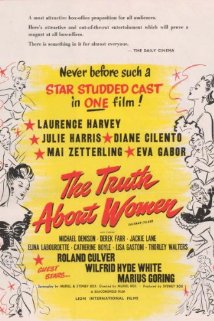
THE TRUTH ABOUT WOMEN
UK, 1957, 107 minutes, Colour.
Laurence Harvey, Julie Harris, Diane Cilento, Mai Zetterling, Eva Gabor, Michael Denison, Derek Farr, Roland Culver, Wilfrid Hyde White, Christopher Lee, Marius Goring, Thorley Walters, Ernest Thesiger, Griffith Jones.
Directed by Muriel Box.
The Truth About Women is a piece of elegant fluff from Britain in the late '50S. It is the work (screenplay, production and direction) of the team of Sydney and Muriel Box. It is an episodic story, giving the opportunity for the action to roam about the elegant places of the world. It is aided by lavish colour photography, sets and decor, costumes by Cecil Beaton.
Laurence Harvey is somewhat sombre, even in his humour, as the hero. However, the women are attractive in their own way - Diane Cilento as the suffragette, Julie Harris as the shy artist, Mai Zetterling as the sympathetic Julie. There is an excellent supporting cast of British character actors and actresses.
1. A pleasing comedy or manners? A British comedy? The '50s looking back at the turn of-the century?
2. Production values: the range of settings, periuds? International flavour? Affluence and elegance? The touch ur the exotic? Costumes and decor? Musical score? The range of stars and character actors and actresses?
3. The title and the theme of the relationships between men and women? The complementarity of men and women? The battle of the sexes? A man's viewpoint? The touch of chauvinism and its acceptance?
4. .The structure of the film: the basic situation, Sir Humphrey persuading his son-in-law to understand his daughter? The flashbacks of explanation? The tracing of Sir Humphrey's life and experience? His ageing? Naivety to experience? An illustrated view of women?
5. Humphrey - in himself: British, pompous, titled, wealthy, his expectations of himself? The heritage of Empire and the 19th century? The attraction towards Ambrosine, the clash with her and her suffragette thinking, free love? The influence of his parents, the expectations of his Public Service career? His note for Ambrosine, giving it to his uncle and his uncle's untimely death? The break with Ambrosine? His going abroad, his infatuation with Saida? The atmosphere of the East, slave markets, the harem? His invasion of the harem to rescue Saida? His friendship with Rollo-and his continued advice? His sojourn in France, the patronage of the Countess, the infatuation with Louise, her husband, high society, the challenge to the duel, the duel itself, death? The parody on honour? Duels and intrigues? The visit to America, the encounter with the attractive American girl, her money-seeking mother? The encounter with Helen in the lift, her art, giving her advice when stuck.in.the lift, his admiration for her, marriage, family, her untimely death? Otto's visit and his iscovering her art - and the busyness of her life? The encounter with Julie, her elegance, social place, the potential scandal, the court case, her loving him and sacrificing herself for him? His marriage to Ambrosine?
6. The portrait of Ambrosine, the frankly-spoken suffragette, the suggestion to their living together, her being hurt by his not writing? Her forgiving him, their marriage?
7. The atmosphere of the East, the slave girl, the harem, the being waited on by the exotic eastern beauty? His rescue attempt and the parody of costumer action films?
8. His experience in France, the aristocracy, the Countess and her patronage, Loulse, the affair, honour? Christopher Lee as the offended husband? The elaborate action of the duel?
9. The visit to the United States, his failing in love, the greedy mother?
10. Julie Harris's delicacy as Helen, her quandary in the lift, her marriage to Sir Humphrey, her devotion to him, the busy life she led, the family, her paintings - and her unfulfilled career? The visit of Otto and his reflection on her art? Julie and her love for Humphrey, the possibility of marriage, her husband being a cad, his taking her to court, the humiliation in the court, the conduct of the case, Julie's decision and her selfsacrifice?
12. Rollo and his continued friendship, advice, in the courts?
13. The comic style of the film? Its lightness and elegance? Insight through a comedy of manners?
Published in Movie Reviews
Published in
Movie Reviews
Tagged under